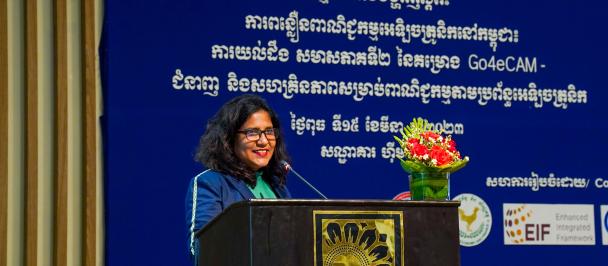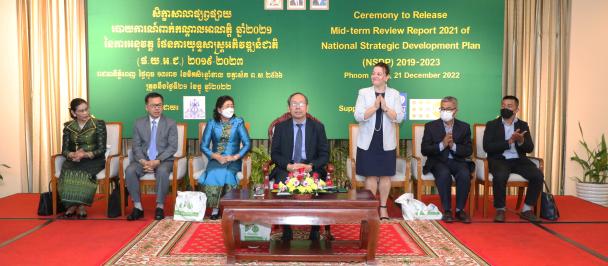Remarks by Ms. Alissar Chaker, Resident Representative, UNDP Cambodia
Consultation Workshop: “Cambodia’s LDC Graduation: Policy Mapping and Sectoral Impact Assessment “
March 7, 2025

Excellency Dr. Poch Bunnak, Secretary of State, Ministry of Planning,
Representatives of the Royal Government of Cambodia,
Colleagues and Distinguished guests.
Good morning, Chom reap sour.
Cambodia has achieved remarkable socioeconomic progress over the past two decades. This led to its confirmed graduation on 19 December 2029 from the Least Developed Countries (LDC) category as per the UN General Assembly Resolution adopted in December 2024. The readiness of the country to exit the LDC category testifies to Cambodia’s significant achievements, but it also resents emerging challenges - most notably, the gradual phase-out of international trade-related support, as well as financial and technical development assistance.
Excellencies, Partners, and Distinguished Guests.
The LDC graduation is a whole-of-society endeavour that extends beyond trade. It would require collective action by the government, development partners, private sector, and civil society to mitigate potential risks, such as employment precarity, an increase in poverty levels, and gender inequality; and to fully capitalise on the opportunities that come with graduation, namely, improved creditworthiness, economic diversification, higher-value exports, and the ability to attract more diverse investments.
Throughout this process, the country would have to navigate in a complex landscape, marked by global and regional uncertainties, like the new wave of protectionist measures and trade wars, and other externalities such as pandemics, climate change, and security. This uncertainty complex would require pre-investments in resources and reform policies to drive timely and just transformations for ensuring Cambodia's smooth and durable graduation. Today’s workshop marks an important step in this journey. I command the Ministry of Planning for organizing this timely event and its leadership in driving the reflection and policy dialogue forward, and thank all line ministries and partners present here today for their commitment and valuable contributions.
Excellencies, Partners, and Distinguished Guests.
Today’s policy mapping and sectoral impact assessment conducted by the Ministry of Planning and UNDP will provide the baseline and key insights into how Cambodia can navigate the graduation process effectively, identifying potential policy gaps and opportunities. It will also serve as a tool for informing the design of sector-specific as well as cross-sectoral strategies to address their specific challenges while harnessing opportunities for accelerating sustainable development.
As part of a broader UN support to the Royal Government of Cambodia for a smooth LDC graduation, UNDP and the Ministry of Planning launched a study and a policy brief in 2023 on the potential impacts of LDC graduation on Cambodia’s international trade. It found out that the loss of trade flexibilities and preferential tariffs will particularly affect key exports such as garments, rice, and bicycles to markets in the European Union, Canada, and the United Kingdom. This impact could slow GDP growth by up to 1.5%, with a potential loss of 165,000 jobs, particularly among women in the garment sector. Without proactive measures, these challenges could hinder Cambodia’s long-term development ambitions and social well-being. The study was used by the Kingdom to negotiate its preparation period and graduation deadline.
In addition, we are developing with the Ministry of Commerce a roadmap to guide Cambodia’s preparedness for green trade standards and the promotion of sustainable trade practices and green value chains to boost competitiveness and sustain access for Cambodian exports to markets such as the European Union. Additionally, it will influence human capital development, technological choices, access to finance (such as impact, ESG, and climate finance for example), and the development of green/ or circular economy in line with global standards and the Kingdom’s commitments (namely, NDCs, and Carbon neutrality, among others).
In parallel, an assessment of responsible business conduct will soon be finalized to position Cambodia as a reliable trading partner. It will feed into the corresponding national plan and is expected to improve Cambodia’s branding and creditworthiness.
A lot is underway…
Excellencies, Partners, and Distinguished Guests.
UNDP remains committed to supporting Cambodia throughout this transition, working closely with national and international partners to accelerate human development, enhance economic diversification and competitiveness, improve the business environment, and position Cambodia as a champion of green and climate-resilient economy in Southeast Asia.
The task is complex and demanding. Your insights and contributions will be instrumental in shaping Cambodia’s Smooth Transition Strategy, which will ensure the country remains on a progressive path of sustainable and inclusive development.
I look forward to the productive and insightful discussion and wish you all a good continuation.
Thank you. Som Arkun!

 Locations
Locations


